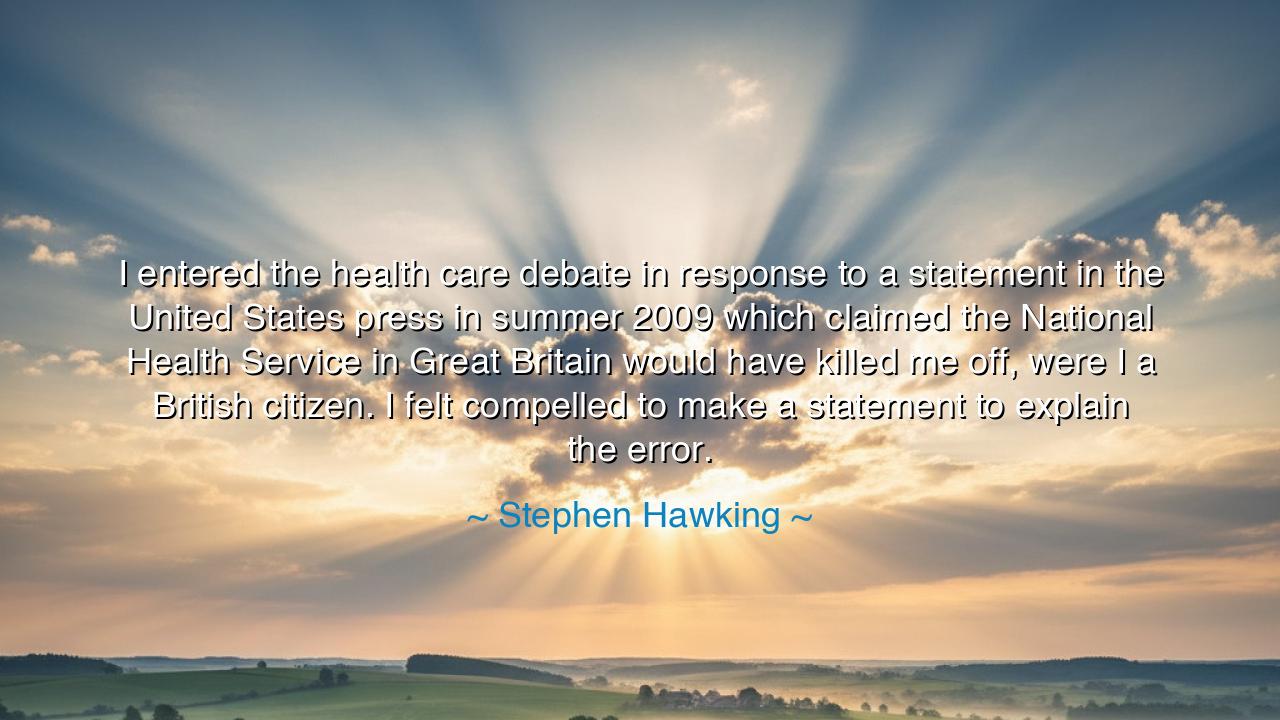
I entered the health care debate in response to a statement in
I entered the health care debate in response to a statement in the United States press in summer 2009 which claimed the National Health Service in Great Britain would have killed me off, were I a British citizen. I felt compelled to make a statement to explain the error.






“I entered the health care debate in response to a statement in the United States press in summer 2009 which claimed the National Health Service in Great Britain would have killed me off, were I a British citizen. I felt compelled to make a statement to explain the error.” Thus spoke Stephen Hawking, one of the greatest minds ever to walk the earth, whose frail body could not confine the vastness of his spirit. His words, though framed in the language of reason, carry a moral force as timeless as the truths of the ancients. For in them lies a defense of truth, gratitude, and the honor of service—a reminder that even genius must rise to correct falsehood when it endangers the welfare of humankind.
In the summer of 2009, as nations wrestled with the great question of health care, a careless voice in the American press claimed that under the National Health Service (NHS), Stephen Hawking himself—paralyzed, voiceless, yet infinitely alive—would have been left to die. It was a cruel irony, for it was that very system, built on compassion and shared responsibility, that had preserved his life and enabled his genius to flourish. Hawking, who rarely entered the din of political argument, felt the call of conscience. He could not allow falsehood to triumph over fact, nor let cynicism tarnish the honor of those who heal. And so he spoke—not in anger, but in clarity—to defend the truth and pay homage to the doctors, nurses, and caretakers who had sustained him through decades of illness.
In this moment, Hawking embodied not only the philosopher, but the warrior of truth. He who had wrestled with the mysteries of black holes and time itself now turned his mind toward the moral universe. For to him, health care was not merely a policy, but a covenant of compassion between a society and its people. The National Health Service, founded after the devastation of war, was the living proof that a nation could choose mercy over profit, humanity over indifference. It was, as he knew, the expression of civilization itself—the belief that no life, however fragile or poor, should be denied the chance to live with dignity.
This act of defense was not for himself alone. Hawking’s statement was for all who depend upon the unseen kindness of healers—the elderly, the infirm, the child born into poverty. His life was a living testament to what a compassionate society can accomplish. For though his body was frail, he lived more than half a century with amyotrophic lateral sclerosis (ALS)—a disease that few survive beyond a few years. It was the care he received from Britain’s public system that gave him time to explore the universe, to write, to teach, to inspire. Without that care, humanity might have lost one of its brightest lights long before he could shine upon the world.
In his quiet rebuke of falsehood, Hawking upheld an ancient truth: that ingratitude blinds the heart, and that a society must remember those who labor not for wealth but for the well-being of others. The doctors, nurses, and researchers who stood beside him were heirs to the same spirit that guided the healers of old—men and women who mixed science with compassion, who saw in each patient a reflection of the divine spark. To mock such devotion is to mock the very principle of civilization; to defend it, as Hawking did, is to defend humanity itself.
The ancients would have recognized in Hawking’s words the voice of the sage who corrects the error of the powerful with truth. Like Socrates before the court, or Gandhi before the empire, he did not shout, but spoke with the quiet authority of one who knows. He did not argue for personal gain, but for justice—for the right of every person, rich or poor, to be cared for when they are weak. In his restraint was his strength; in his frailty, his greatness. His life proved that intellect and compassion, joined together, can move the world as surely as any army or king.
Thus, the lesson of Hawking’s declaration is clear: when falsehood arises, truth must answer. When gratitude fades, it must be rekindled. Each of us, in our own way, must become defenders of what is just and humane. Support the healers; speak against lies; honor those systems that serve the vulnerable. For without compassion, knowledge is hollow; and without truth, courage is blind.
So remember, O listener, these words of the wise: effort without compassion builds nothing lasting; power without mercy corrupts the soul. The measure of a nation is not its wealth or armies, but its kindness to the weak. And in defending that kindness—as Stephen Hawking did, softly but firmly—we keep alive the sacred promise that binds us all: that life, in all its frailty and wonder, is worth protecting.






AAdministratorAdministrator
Welcome, honored guests. Please leave a comment, we will respond soon